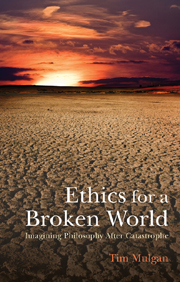Book contents
- Frontmatter
- Contents
- Acknowledgements
- Preface: Imagining a broken world
- Introductory lecture: Philosophy in the age of affluence
- Part I Rights
- Lecture 1 Nozick on rights
- Lecture 2 Self-ownership
- Lecture 3 The Lockean proviso
- Lecture 4 Nozick in a broken world
- Lecture 5 Nationalism
- Part II Utilitarianism
- Part III The social contract
- Part IV Democracy
- Reading list
- Bibliography
- Index
Lecture 4 - Nozick in a broken world
from Part I - Rights
- Frontmatter
- Contents
- Acknowledgements
- Preface: Imagining a broken world
- Introductory lecture: Philosophy in the age of affluence
- Part I Rights
- Lecture 1 Nozick on rights
- Lecture 2 Self-ownership
- Lecture 3 The Lockean proviso
- Lecture 4 Nozick in a broken world
- Lecture 5 Nationalism
- Part II Utilitarianism
- Part III The social contract
- Part IV Democracy
- Reading list
- Bibliography
- Index
Summary
The broken future
Nozick's proviso was not straightforward in an affluent world with a bright future. But we now know that the unconstrained exercise of property rights caused dangerous climate change. So we should imagine a free society with a broken future. Suppose I am an initial acquirer in that world. To satisfy Nozick's proviso, I must now be confident that no one in the broken future will be worse off than in a world without property. This is a tall order. In our (real-life) broken world, many people now argue that we should abandon our faltering at empts to resurrect industrial civilization and return to primitive ways of life. These people would certainly prefer Stone Age life in an unbroken world, but that option is lost. They insist that past acquisition has harmed them. Given his objection to paternalism, how could Nozick have disagreed?
Nozick wrote before humans understood climate change. Suppose he had realized that his world had a broken future. How might he have defended his theory? He might have simply denied that his free society could ever have a broken future. Climate changing behaviour either is irrational or violates property rights. This is not how free rational agents behave. (This would obviously have made the gulf between Nozick's fantasy world and affluent reality even wider.
- Type
- Chapter
- Information
- Ethics for a Broken WorldImagining Philosophy after Catastrophe, pp. 56 - 68Publisher: Acumen PublishingPrint publication year: 2011

